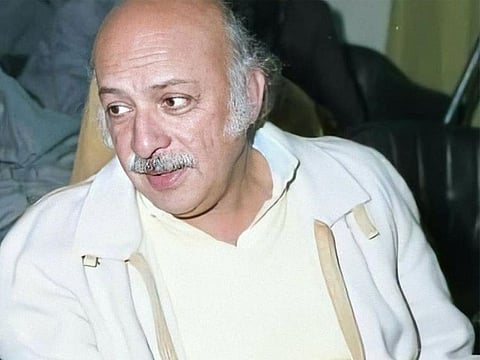Renowned Iraqi poet Muzaffar Al Nawab dies aged 88
He was often known as 'revolutionary poet'

Dubai: Iraqi poet Muzaffar Al Nawab, one of Iraq's most famous and influential poets, has passed away today at the age of 88, local media reported.
The Iraqi Media Network mourned Al Nawab in a statement, which reads "The Board of Trustees of the Iraqi Media Network mourns the Iraqi poet (Muthaffar Al-Nawab) who passed away today in the UAE, at Sharjah Teaching Hospital.
Al Nawab was born in Baghdad, in 1934 into an aristocratic family of Indian origin that appreciated art, poetry and music.
He showed a talent for poetry from an early age. He completed his undergraduate studies at the University of Baghdad and became a teacher, but was expelled for political reasons in 1955 and remained unemployed for three years, at a difficult time for his family who was suffering financial hardship.
He joined the Iraqi Communist Party while still at college, and was tortured by the Hashemite Government. After the Iraqi revolution in 1958 which overthrew the monarchy, he was appointed as an inspector at the Ministry of Education. In 1963 he was forced to leave Iraq for neighbouring Iran, after the intensification of competition between the nationalists and the communists who were exposed to prosecution and strict observation by the ruling regime.
He was arrested and tortured by the Iranian secret police, before being forcibly repatriated to the Iraqi government. An Iraqi court handed down a death sentence against him for one of his poems, later commuted to life imprisonment. He escaped prison by digging a tunnel and fled to the marshlands, where he joined a communist faction that sought to overthrow the government.
Known for his powerful revolutionary poems and scathing invectives against Arab dictators, he lived in exile in many countries, including Syria, Egypt, Lebanon and Eritrea, where he stayed with the Eritrean rebels, before returning to Iraq in 2011. Before he returned to Iraq, he had been essentially stateless being able to travel only on Libyan travel documents. The first complete Arabic language edition of his works was published in London in 1996 by "Dar Qanbar".
He was often known as the "revolutionary poet". His poetry is replete with Arab and international revolutionary symbols. He used his work to incite public emotions against repressive regimes, political corruption and injustice.
His language was harsh, with occasional use of profanity. His earliest writing employed the southern Iraq dialect because he believed that the region was more revolutionary.
However, the use of that particular dialect failed to garner a mass audience, and he eventually switched to classical language in his later works.
Sign up for the Daily Briefing
Get the latest news and updates straight to your inbox


